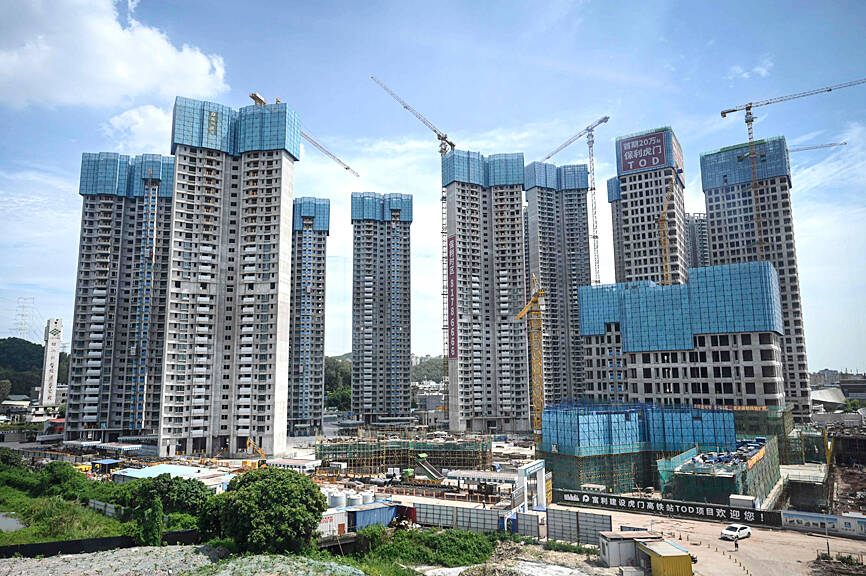China has announced that it is investigating several executives at state-owned property companies over allegations of “serious violations of discipline and law.”
The probes are another blow to a key sector, which is already struggling with slowing sales, angry customers and heavily indebted developers.
Authorities said in separate notices on Tuesday that they were investigating Zhuang Yuekai (莊躍凱), chairman of C&D Real Estate Corp (建發房地產), and Shi Zhen (施震), chairman of C&D Urban Services Co (建發城服發展).

Photo: AFP
They are also looking into Liu Hui (劉暉), deputy general manager of Shenzhen Talents Housing Group (深圳市才安居集團), and Tang Yong (唐勇), a former chairman at China Resources Land Ltd (華潤置地).
All four were “suspected of serious violations of discipline and law,” the notices said, providing few details.
However, the language used in the announcements typically indicates impending graft charges.
These investigations might “deal a further blow to investor confidence and cause market worries about the internal governance of some state-owned enterprises,” Australia and New Zealand Banking Group Ltd analyst Ting Meng (孟婷) told Bloomberg News.
The investigations come ahead of the Chinese Communist Party’s 20th National Congress, at which Chinese President Xi Jinping (習近平) is widely expected to be anointed for an unprecedented third term.
Xi has championed an anti-corruption drive since coming to power, taking down big-name detractors, and observers expect him to use the months leading up to the meeting to cement his grip on power.
The probes follow a regulatory crackdown on some of China’s biggest tech firms.
Authorities have also in recent months announced investigations into figures in the semiconductor industry, including Chinese Minister of Industry and Information Technology Xiao Yaqing (肖亞慶).
Regulatory heads, insurance giants, security officials and financiers have faced censure or prosecution under the anti-corruption drive, but it is rare for a minister to be targeted while still in office.
The vast majority of people who have been investigated for corruption in China were eventually convicted.

UNCERTAINTY: Innolux activated a stringent supply chain management mechanism, as it did during the COVID-19 pandemic, to ensure optimal inventory levels for customers Flat-panel display makers AUO Corp (友達) and Innolux Corp (群創) yesterday said that about 12 to 20 percent of their display business is at risk of potential US tariffs and that they would relocate production or shipment destinations to mitigate the levies’ effects. US tariffs would have a direct impact of US$200 million on AUO’s revenue, company chairman Paul Peng (彭雙浪) told reporters on the sidelines of the Touch Taiwan trade show in Taipei yesterday. That would make up about 12 percent of the company’s overall revenue. To cope with the tariff uncertainty, AUO plans to allocate its production to manufacturing facilities in

Taiwan will prioritize the development of silicon photonics by taking advantage of its strength in the semiconductor industry to build another shield to protect the local economy, National Development Council (NDC) Minister Paul Liu (劉鏡清) said yesterday. Speaking at a meeting of the legislature’s Economics Committee, Liu said Taiwan already has the artificial intelligence (AI) industry as a shield, after the semiconductor industry, to safeguard the country, and is looking at new unique fields to build more economic shields. While Taiwan will further strengthen its existing shields, over the longer term, the country is determined to focus on such potential segments as

TAKING STOCK: A Taiwanese cookware firm in Vietnam urged customers to assess inventory or place orders early so shipments can reach the US while tariffs are paused Taiwanese businesses in Vietnam are exploring alternatives after the White House imposed a 46 percent import duty on Vietnamese goods, following US President Donald Trump’s announcement of “reciprocal” tariffs on the US’ trading partners. Lo Shih-liang (羅世良), chairman of Brico Industry Co (裕茂工業), a Taiwanese company that manufactures cast iron cookware and stove components in Vietnam, said that more than 40 percent of his business was tied to the US market, describing the constant US policy shifts as an emotional roller coaster. “I work during the day and stay up all night watching the news. I’ve been following US news until 3am

COLLABORATION: Given Taiwan’s key position in global supply chains, the US firm is discussing strategies with local partners and clients to deal with global uncertainties Advanced Micro Devices Inc (AMD) yesterday said it is meeting with local ecosystem partners, including Taiwan Semiconductor Manufacturing Co (TSMC, 台積電), to discuss strategies, including long-term manufacturing, to navigate uncertainties such as US tariffs, as Taiwan occupies an important position in global supply chains. AMD chief executive officer Lisa Su (蘇姿丰) told reporters that Taiwan is an important part of the chip designer’s ecosystem and she is discussing with partners and customers in Taiwan to forge strong collaborations on different areas during this critical period. AMD has just become the first artificial-intelligence (AI) server chip customer of TSMC to utilize its advanced